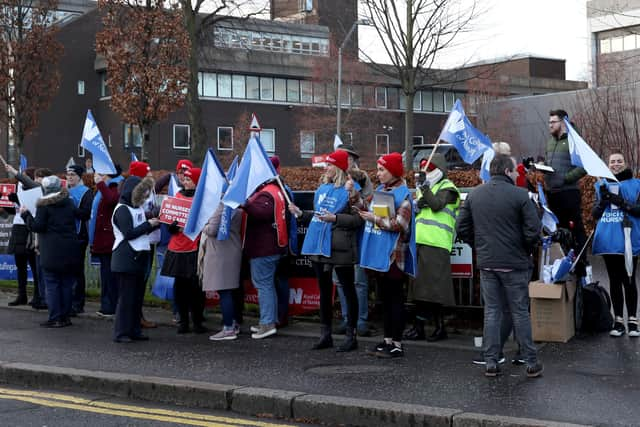Unions to ballot on strike action
and live on Freeview channel 276
With inflation soaring and health unions in other parts of the UK unhappy with a 4.5% pay offer, staff in Northern Ireland are still without a formal pay offer.
In England, Scotland and Wales the Royal College of Nursing has already announced that it will hold a statutory strike ballot next month.
Advertisement
Hide AdAdvertisement
Hide AdThis follows a pay award of 4.5% for NHS staff that was put forward by a pay review body in July.


Nurses in Scotland have already voted, in an indicative ballot, to reject their pay offer and are set to decide whether to go ahead with strike action when the Royal College of Nursing’s formal ballot opens on September 15.
In Northern Ireland, however, Health Minister Robin Swann said in July that the absence of a fully functioning Executive at Stormont means he is unable to implement even the recommended 4.5% uplift for nurses and other health workers.
The News Letter understands several health unions are now making behind-the-scenes preparations to formally ask workers here if they are prepared to strike.
Advertisement
Hide AdAdvertisement
Hide AdAmong the unions understood to be preparing to ballot its Northern Ireland members is the Royal College of Nursing, with any statutory ballot understood to be likely to take place at around the same time as the statutory ballot in Great Britain in the autumn.
The only time the union has ever taken strike action in Northern Ireland in its history was in the winter of 2019.
At that time, health staff were demanding pay parity with colleagues in other parts of the UK, along with assurances on safe staffing levels.
By the winter of 2019 the Stormont Executive had not been functioning for nearly three years and there was no Executive in place to agree to a pay offer. It wasn’t until the New Decade New Approach Agreement was signed in January 2020 and an Executive was formed that the strike was brought to an end following negotiations with the then newly appointed Minister Swann.
Advertisement
Hide AdAdvertisement
Hide AdSeveral other health unions, including Unison and Nipsa, took part in that strike.
In July this year, following the latest pay recommendation, Mr Swann raised the prospect of a repeat of the same scenario this time around due to the absence of an Executive.
Speaking at Stormont, he said: “My biggest problem, and we are almost back to where we were in December 2019, January 2020, is that unlike my colleagues in other parts of the United Kingdom I am unable to announce the immediate implementation of those pay awards because in Northern Ireland we still don’t have an agreed Executive budget and until we get to that point we can’t move forward.”